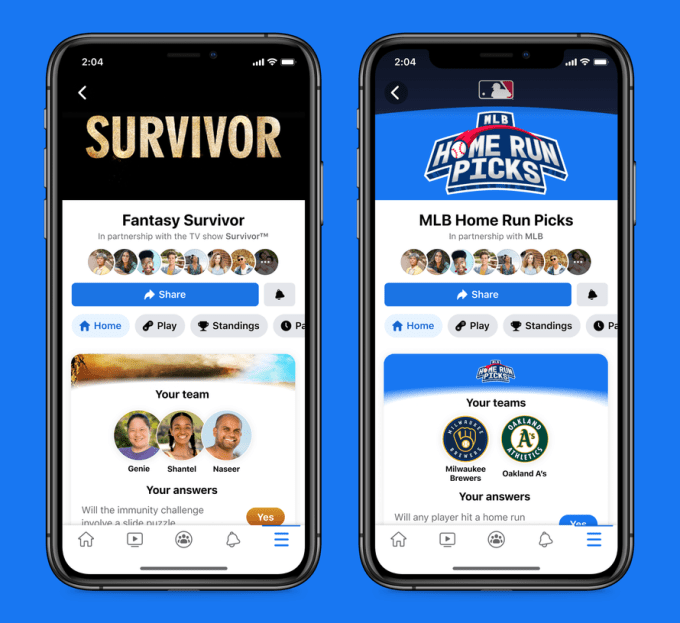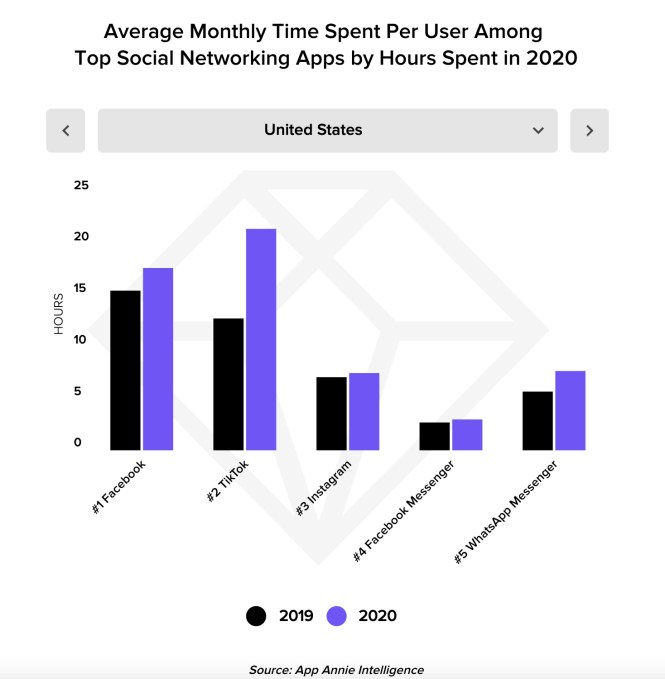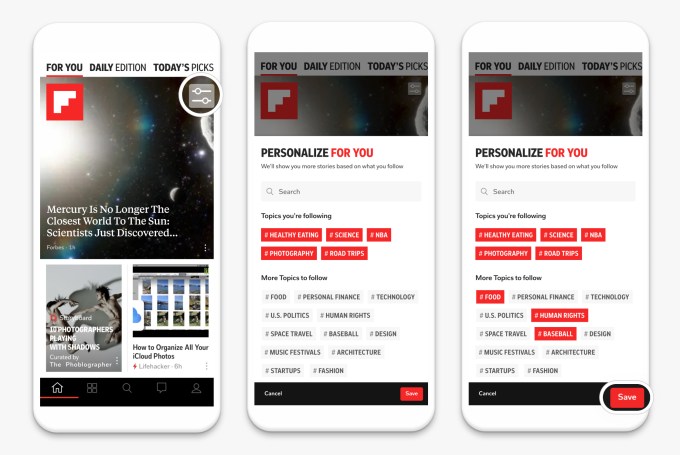Apps
Auto Added by WPeMatico
Auto Added by WPeMatico
A startup called Playbyte wants to become the TikTok for games. The company’s newly launched iOS app offers tools that allow users to make and share simple games on their phone, as well as a vertically scrollable, fullscreen feed where you can play the games created by others. Also like TikTok, the feed becomes more personalized over time to serve up more of the kinds of games you like to play.
While typically, game creation involves some aspect of coding, Playbyte’s games are created using simple building blocks, emoji and even images from your Camera Roll on your iPhone. The idea is to make building games just another form of self-expression, rather than some introductory, educational experience that’s trying to teach users the basics of coding.
At its core, Playbyte’s game creation is powered by its lightweight 2D game engine built on web frameworks, which lets users create games that can be quickly loaded and played even on slow connections and older devices. After you play a game, you can like and comment using buttons on the right-side of the screen, which also greatly resembles the TikTok look-and-feel. Over time, Playbyte’s feed shows you more of the games you enjoyed as the app leverages its understanding of in-game imagery, tags and descriptions, and other engagement analytics to serve up more games it believes you’ll find compelling.
At launch, users have already made a variety of games using Playbyte’s tools — including simulators, tower defense games, combat challenges, obbys, murder mystery games, and more.
According to Playbyte founder and CEO Kyle Russell — previously of Skydio, Andreessen Horowitz, and (disclosure!) TechCrunch — Playbyte is meant to be a social media app, not just a games app.
“We have this model in our minds for what is required to build a new social media platform,” he says.
What Twitter did for text, Instagram did for photos and TikTok did for video was to combine a constraint with a personalized feed, Russell explains. “Typically. [they started] with a focus on making these experiences really brief…So a short, constrained format and dedicated tools that set you up for success to work within that constrained format,” he adds.
Similarly, Playbyte games have their own set of limitations. In addition to their simplistic nature, the games are limited to five scenes. Thanks to this constraint, a format has emerged where people are making games that have an intro screen where you hit “play,” a story intro, a challenging gameplay section, and then a story outro.
In addition to its easy-to-use game building tools, Playbyte also allows game assets to be reused by other game creators. That means if someone who has more expertise makes a game asset using custom logic or which pieced together multiple components, the rest of the user base can benefit from that work.
“Basically, we want to make it really easy for people who aren’t as ambitious to still feel like productive, creative game makers,” says Russell. “The key to that is going to be if you have an idea — like an image of a game in your mind — you should be able to very quickly search for new assets or piece together other ones you’ve previously saved. And then just drop them in and mix-and-match — almost like Legos — and construct something that’s 90% of what you imagined, without any further configuration on your part,” he says.
In time, Playbyte plans to monetize its feed with brand advertising, perhaps by allowing creators to drop sponsored assets into their games, for instance. It also wants to establish some sort of patronage model at a later point. This could involve either subscriptions or even NFTs of the games, but this would be further down the road.
The startup had originally began as a web app in 2019, but at the end of last year, the team scrapped that plan and rewrote everything as a native iOS app with its own game engine. That app launched on the App Store this week, after previously maxing out TestFlight’s cap of 10,000 users.
Currently, it’s finding traction with younger teenagers who are active on TikTok and other collaborative games, like Roblox, Minecraft, or Fortnite.
“These are young people who feel inspired to build their own games but have been intimidated by the need to learn to code or use other advanced tools, or who simply don’t have a computer at home that would let them access those tools,” notes Russell.
Playbyte is backed by $4 million in pre-seed and seed funding from investors including FirstMark (Rick Heitzmann), Ludlow Ventures (Jonathon Triest and Blake Robbins), Dream Machine (former Editor-in-Chief at TechCrunch, Alexia Bonatsos), and angels such as Fred Ehrsam, co-founder of Coinbase; Nate Mitchell, co-founder of Oculus; Ashita Achuthan, previously of Twitter; and others.
The app is a free download on the App Store.
Powered by WPeMatico
TheCut, a technology platform designed to handle back-end operations for barbers, raised $4.5 million in new funding.
Nextgen Venture Partners led the round and was joined by Elevate Ventures, Singh Capital and Leadout Capital. The latest funding gives theCut $5.35 million in total funding since the company was founded in 2016, founder Obi Omile Jr. told TechCrunch.
Omile and Kush Patel created the mobile app that provides information and reviews on barbers for potential customers while also managing appointments, mobile payments and pricing on the back end for barbers.
“Kush and I both had terrible experiences with haircuts, and decided to build an app to help find good barbers,” Omile said. “We found there were great barbers, but no way to discover them. You can do a Google search, but it doesn’t list the individual barber. With theCut, you can discover an individual barber and discover if they are a great fit for you and won’t screw up your hair.”
The app also enables barbers, perhaps for the first time, to have a list of clients and keep notes and photos of hair styles, as well as track visits and spending. By providing payments, barbers can also leverage digital trends to provide additional services and extras to bring in more revenue. On the customer side, there is a search function with barber profile, photos of their work, ratings and reviews, a list of service offerings and pricing.
Omile said there are 400,000 to 600,000 barbers in the U.S., and it is one of the fastest-growth markets. As a result, the new funding will be used to hire additional talent, marketing and to grow the business across the country.
“We’ve gotten to a place where we are hitting our stride and seeing business catapulting, so we are in hiring mode,” he added.
Indeed, the company generated more than $500 million in revenue for barbers since its launch and is adding over 100,000 users each month. In addition, the app averages 1.5 million appointment bookings each month.
Next up, Omile wants to build out some new features like a digital store and the ability to process more physical payments by rolling out a card reader for in-person payments. TheCut will also focus on enabling barbers to have more personal relationships with their customers.
“We are building software to empower people to be the best version of themselves, in this case barbers,” he added. “The relationship with customers is an opportunity for the barber to make specific recommendations on products and create a grooming experience.”
As part of the investment, Leadout founder and managing partner Ali Rosenthal joined the company’s board of directors. She said Omile and Patel are the kind of founders that venture capitalists look for — experts in their markets and data-driven technologists.
“They had done so much with so little by the time we met them,” Rosenthal added. “They are creating a passionate community and set of modern, tech-driven features that are tailored to the needs of their customers.”
Powered by WPeMatico
If the past 18 months is any indication, the nature of the workplace is changing. And while Box and Zoom already have integrations together, it makes sense for them to continue to work more closely.
Their newest collaboration is the Box app for Zoom, a new type of in-product integration that allows users to bring apps into a Zoom meeting to provide the full Box experience.
While in Zoom, users can securely and directly access Box to browse, preview and share files from Zoom — even if they are not taking part in an active meeting. This new feature follows a Zoom integration Box launched last year with its “Recommended Apps” section that enables access to Zoom from Box so that workflows aren’t disrupted.
The companies’ chief product officers, Diego Dugatkin with Box and Oded Gal with Zoom, discussed with TechCrunch why seamless partnerships like these are a solution for the changing workplace.
With digitization happening everywhere, an integration of “best-in-breed” products for collaboration is essential, Dugatkin said. Not only that, people don’t want to be moving from app to app, instead wanting to stay in one environment.
“It’s access to content while never having to leave the Zoom platform,” he added.
It’s also access to content and contacts in different situations. When everyone was in an office, meeting at a moment’s notice internally was not a challenge. Now, more people are understanding the value of flexibility, and both Gal and Dugatkin expect that spending some time at home and some time in the office will not change anytime soon.
As a result, across the spectrum of a company, there is an increasing need for allowing and even empowering people to work from anywhere, Dugatkin said. That then leads to a conversation about sharing documents in a secure way for companies, which this collaboration enables.
The new Box and Zoom integration enables meeting in a hybrid workplace: chat, video, audio, computers or mobile devices, and also being able to access content from all of those methods, Gal said.
“Companies need to be dynamic as people make the decision of how they want to work,” he added. “The digital world is providing that flexibility.”
This long-term partnership is just scratching the surface of the continuous improvement the companies have planned, Dugatkin said.
Dugatkin and Gal expect to continue offering seamless integration before, during and after meetings: utilizing Box’s cloud storage, while also offering the ability for offline communication between people so that they can keep the workflow going.
“As Diego said about digitization, we are seeing continuous collaboration enhanced with the communication aspect of meetings day in and day out,” Gal added. “Being able to connect between asynchronous and synchronous with Zoom is addressing the future of work and how it is shaping where we go in the future.”
Powered by WPeMatico
YouTravel.Me is the latest startup to grab some venture capital dollars as the travel industry gets back on its feet amid the global pandemic.
Over the past month, we’ve seen companies like Thatch raise $3 million for its platform aimed at travel creators, travel tech company Hopper bring in $175 million, Wheel the World grab $2 million for its disability-friendly vacation planner, Elude raise $2.1 million to bring spontaneous travel back to a hard-hit industry and Wanderlog bag $1.5 million for its free travel itinerary platform.
Today YouTravel.Me joins them after raising $1 million to continue developing its online platform designed for matching like-minded travelers to small-group adventures organized by travel experts. Starta VC led the round and was joined by Liqvest.com, Mission Gate and a group of individual investors like Bas Godska, general partner at Acrobator Ventures.
Olga Bortnikova, her husband Ivan Bortnikov and Ivan Mikheev founded the company in Europe three years ago. The idea for the company came to Bortnikova and Bortnikov when a trip to China went awry after a tour operator sold them a package where excursions turned out to be trips to souvenir shops. One delayed flight and other mishaps along the way, and the pair went looking for better travel experiences and a way to share them with others. When they couldn’t find what they were looking for, they decided to create it themselves.
“It’s hard for adults to make friends, but when you are on a two-week trip with just 15 people in a group, you form a deep connection, share the same language and experiences,” Bortnikova told TechCrunch. “That’s our secret sauce — we want to make a connection.”
Much like a dating app, the YouTravel.Me’s algorithms connect travelers to trips and getaways based on their interests, values and past experiences. Matched individuals can connect with each via chat or voice, work with a travel expert and complete their reservations. They also have a BeGuide offering for travel experts to do research and create itineraries.
Since 2018, CEO Bortnikova said that YouTravel.Me has become the top travel marketplace in Eastern Europe, amassing over 15,900 tours in 130 countries and attracting over 10,000 travelers and 4,200 travel experts to the platform. It was starting to branch out to international sales in 2020 when the global pandemic hit.
“Sales and tourism crashed down, and we didn’t know what to do,” she said. “We found that we have more than 4,000 travel experts on our site and they feel lonely because the pandemic was a test of the industry. We understood that and built a community and educational product for them on how to build and scale their business.”
After a McKinsey study showed that adventure travel was recovering faster than other sectors of the industry, the founders decided to go after that market, becoming part of 500 Startups at the end of 2020. As a result, YouTravel.Me doubled its revenue while still a bootstrapped company, but wanted to enter the North American market.
The new funding will be deployed into marketing in the U.S., hiring and attracting more travel experts, technology and product development and increasing gross merchandise value to $2.7 million per month by the end of 2021, Bortnikov said. The goal is to grow the number of trips to 20,000 and its travel experts to 6,000 by the beginning of next year.
Godska, also an angel investor, learned about YouTravel.Me from a mutual friend. It happened that it was the same time that he was vacationing in Sri Lanka where he was one of very few tourists. Godska was previously involved in online travel before as part of Orbitz in Europe and in Russia selling tour packages before setting up a venture capital fund.
“I was sitting there in the jungle with a bad internet connection, and it sparked my interest,” he said. “When I spoke with them, I felt the innovation and this bright vibe of how they are doing this. It instantly attracted me to help support them. The whole curated thing is a very interesting move. Independent travelers that want to travel in groups are not touched much by the traditional sector.”
Powered by WPeMatico
Pixalate raised $18.1 million in growth capital for its fraud protection, privacy and compliance analytics platform that monitors connected television and mobile advertising.
Western Technology Investment and Javelin Venture Partners led the latest funding round, which brings Pixalate’s total funding to $22.7 million to date. This includes a $4.6 million Series A round raised back in 2014, Jalal Nasir, founder and CEO of Pixalate, told TechCrunch.
The company, with offices in Palo Alto and London, analyzes over 5 million apps across five app stores and more 2 billion IP addresses across 300 million connected television devices to detect and report fraudulent advertising activity for its customers. In fact, there are over 40 types of invalid traffic, Nasir said.
Nasir grew up going to livestock shows with his grandfather and learned how to spot defects in animals, and he has carried that kind of insight to Pixalate, which can detect the difference between real and fake users of content and if fraudulent ads are being stacked or hidden behind real advertising that zaps smartphone batteries or siphons internet usage and even ad revenue.
Digital advertising is big business. Nasir cited Association of National Advertisers research that estimated $200 billion will be spent globally in digital advertising this year. This is up from $10 billion a year prior to 2010. Meanwhile, estimated ad fraud will cost the industry $35 billion, he added.
“Advertisers are paying a premium to be in front of the right audience, based on consumption data,” Nasir said. “Unfortunately, that data may not be authorized by the user or it is being transmitted without their consent.”
While many of Pixalate’s competitors focus on first-party risks, the company is taking a third-party approach, mainly due to people spending so much time on their devices. Some of the insights the company has found include that 16% of Apple’s apps don’t have privacy policies in place, while that number is 22% in Google’s app store. More crime and more government regulations around privacy mean that advertisers are demanding more answers, he said.
The new funding will go toward adding more privacy and data features to its product, doubling the sales and customer teams and expanding its office in London, while also opening a new office in Singapore.
The company grew 1,200% in revenue since 2014 and is gathering over 2 terabytes of data per month. In addition to the five app stores Pixalate is already monitoring, Nasir intends to add some of the China-based stores like Tencent and Baidu.
Noah Doyle, managing director at Javelin Venture Partners, is also monitoring the digital advertising ecosystem and said with networks growing, every linkage point exposes a place in an app where bad actors can come in, which was inaccessible in the past, and advertisers need a way to protect that.
“Jalal and Amin (Bandeali) have insight from where the fraud could take place and created a unique way to solve this large problem,” Doyle added. “We were impressed by their insight and vision to create an analytical approach to capturing every data point in a series of transactions — more data than other players in the industry — for comprehensive visibility to help advertisers and marketers maintain quality in their advertising.”
Powered by WPeMatico
Summer is still technically in session, but a snowball is slowly developing in the world of apps, and specifically the world of in-app payments. A report in Reuters today says that the Competition Commission of India, the country’s monopoly regulator, will soon be looking at an antitrust suit filed against Apple over how it mandates that app developers use Apple’s own in-app payment system — thereby giving Apple a cut of those payments — when publishers charge users for subscriptions and other items in their apps.
The suit, filed by an Indian nonprofit called “Together We Fight Society”, said in a statement to Reuters that it was representing consumer and startup interests in its complaint.
The move would be the latest in what has become a string of challenges from national regulators against app store operators — specifically Apple but also others like Google and WeChat — over how they wield their positions to enforce market practices that critics have argued are anti-competitive. Other countries that have in recent weeks reached settlements, passed laws or are about to introduce laws include Japan, South Korea, Australia, the U.S. and the European Union.
And in India specifically, the regulator is currently working through a similar investigation as it relates to in-app payments in Android apps, which Google mandates use its proprietary payment system. Google and Android dominate the Indian smartphone market, with the operating system active on 98% of the 520 million devices in use in the country as of the end of 2020.
It will be interesting to watch whether more countries wade in as a result of these developments. Ultimately, it could force app store operators, to avoid further and deeper regulatory scrutiny, to adopt new and more flexible universal policies.
In the meantime, we are seeing changes happen on a country-by-country basis.
Just yesterday, Apple reached a settlement in Japan that will let publishers of “reader” apps (those for using or consuming media like books and news, music, files in the cloud and more) to redirect users to external sites to provide alternatives to Apple’s proprietary in-app payment provision. Although it’s not as seamless as paying within the app, redirecting previously was typically not allowed, and in doing so the publishers can avoid Apple’s cut.
South Korean legislators earlier this week approved a measure that will make it illegal for Apple and Google to make a commission by forcing developers to use their proprietary payment systems.
And last week, Apple also made some movements in the U.S. around allowing alternative forms of payments, but, relatively speaking, the concessions were somewhat indirect: app publishers can refer to alternative, direct payment options in apps now, but not actually offer them. (Not yet at least.)
Some developers and consumers have been arguing for years that Apple’s strict policies should open up more. Apple however has long said in its defense that it mandates certain developer policies to build better overall user experiences, and for reasons of security. But, as app technology has evolved, and consumer habits have changed, critics believe that this position needs to be reconsidered.
One factor in Apple’s defense in India specifically might be the company’s position in the market. Android absolutely dominates India when it comes to smartphones and mobile services, with Apple actually a very small part of the ecosystem.
As of the end of 2020, it accounted for just 2% of the 520 million smartphones in use in the country, according to figures from Counterpoint Research quoted by Reuters. That figure had doubled in the last five years, but it’s a long way from a majority, or even significant minority.
The antitrust filing in India has yet to be filed formally, but Reuters notes that the wording leans on the fact that anti-competitive practices in payments systems make it less viable for many publishers to exist at all, since the economics simply do not add up:
“The existence of the 30% commission means that some app developers will never make it to the market,” Reuters noted from the filing. “This could also result in consumer harm.”
Powered by WPeMatico
Facebook is getting into fantasy sports and other types of fantasy games. The company this morning announced the launch of Facebook Fantasy Games in the U.S. and Canada on the Facebook app for iOS and Android. Some games are described as “simpler” versions of the traditional fantasy sports games already on the market, while others allow users to make predictions associated with popular TV series, like “Survivor” or “The Bachelorette.”
The first game to launch is Pick & Play Sports, in partnership with Whistle Sports, where fans get points for correctly predicting the winner of a big game, the points scored by a top player or other events that unfold during the match. Players can also earn bonus points for building a streak of correct predictions over several days. This game is arriving today.

Image Credits: Facebook
In the months ahead, it will be followed by other games in sports, TV and pop culture, including Fantasy Survivor, where players choose a set of castaways from the popular CBS TV show to join their fantasy team and Fantasy “The Bachelorette,” where fans will pick a group of men from the suitors vying for the Bachelorette’s heart and get points based on their actions and events that take place during the show. Other upcoming sports-focused games include MLB Home Run Picks, where players pick the team that they think will hit the most home runs, and LaLiga Winning Streak, where fans predict the team that will win that day.
In addition to top players being featured on leaderboards, games have a social component for those who want to play with friends.

Image Credits: Facebook
Players can create their own fantasy league with friends to compete with one another or against other fans, either publicly or privately. League members can compare scores with each other and will have a place where they can share picks, reactions and comments. This league area resembles a private group on Facebook, as it offers its own compose box for posting only to members, and its own dedicated feed. However, the page is designed to support groups with specific buttons to “play” or view the “leaderboard,” among others.
The addition of fantasy games could help Facebook increase the time users spent on its app at a time when the company is facing significant competition in social, namely from TikTok. According to App Annie, the average monthly time spent per user in TikTok grew faster than other top social apps in 2020, including by 70% in the U.S., surpassing Facebook.

Facebook had dabbled with the idea of becoming a second screen companion for live events in the past, but in a different way than fantasy sports and games. Instead, its R&D division tested Venue, which worked as a way for fans to comment on live events which were hosted in the app by well-known personalities.
The company has several other gaming investments, as well, including through its cloud gaming service on the desktop web and Android, its Games tab for streamers, and its VR company, Oculus.
The new league games will be available from the bookmark menu on the mobile app and in News Feed through notifications.
Powered by WPeMatico
Duda announced Wednesday that it acquired Canada-based Snipcart, a startup that enables businesses to add a shopping cart to their websites.
The acquisition is Palo Alto-based Duda’s first deal, and follows the website development platform’s $50 million Series D round in June that brings its total funding to $100 million to date. Duda co-founder and CEO Itai Sadan declined to comment on the acquisition amount.
Duda, which works with digital agencies and SaaS companies, has approximately 1 million published paying sites, and the acquisition was driven by the company seeing a boost in e-commerce websites as a result of the global pandemic, he told TechCrunch.
This was not just about a technology acquisition for Duda, but also a talented team, Sadan said. The entire Snipcart team of 12 is staying on, including CEO Francois Lanthier Nadeau; the companies will be fully integrated by 2022 and the first collaborative versions will come out.
When he met the Snipcart team, Sadan thought they were “super experienced and held the same values.”
“We share many of the same types of customers, many of which are API-first,” he added. “If our customers need more headless commerce, they can build their own front end using Snipcart. Their customers will benefit from us growing the team — we plan to double it in the next year and roll out more features at a faster pace.”
The global retail e-commerce market is estimated to grow by 50% to $6.3 trillion by 2024, according to Statista. Duda itself has experienced a year over year increase of 265% in e-commerce sites being built on its platform, which Sadan said was what made Snipcart an attractive acquisition to further accelerate and manage its growth that includes over 17,000 customers.
Together, the companies will offer new capabilities, like payment and membership tools inside of the Duda platform. Many of Duda’s customers come with inventory and don’t want to manage it on another e-commerce platform, so Snipcart will be that component for taking their inventory and making it shoppable on the web.
“Everyone is thinking about how to introduce transactions into their websites and web experiences, and that is what we were looking for in an e-commerce platform,” Sadan said.
Powered by WPeMatico
Even as hundreds of millions of people in India have a bank account, only a tiny fraction of this population invests in any financial instrument.
Fewer than 30 million people invest in mutual funds or stocks, for instance. In recent years, a handful of startups have made it easier for users — especially the millennials — to invest, but the figure has largely remained stagnant.
Now, an Indian startup believes that it has found the solution to tackle this challenge — and is already seeing good early traction.
Nishchay AG, former director of mobility startup Bounce, and Misbah Ashraf, co-founder of Marsplay (sold to Foxy), founded Jar earlier this year.
The startup’s eponymous six-month-old Android app enables users to start their savings journey for as little as 1 Indian rupee.
Users on Jar can invest in multiple ways and get started within seconds. The app works with Paytm (PhonePe support is in the works) to set up a recurring payment. (The startup is the first to use UPI 2.0’s recurring payment support.) They can set up any amount between 1 Indian rupee to 500 for daily investments.
The Jar app can also glean users’ text messages and save a tiny amount based on each monetary transaction they do. So, for instance, if a user has spent 31 rupees in a transaction, the Jar app rounds that up to the nearest tenth figure (40, in this case) and saves nine rupees. Users can also manually open the app and spend any amount they wish to invest.
Once users have saved some money in Jar, the app then invests that into digital gold.
The startup is using gold investment because people in the South Asian market already have an immense trust in this asset class.
India has a unique fascination for gold. From rural farmers to urban working class, nearly everyone stashes the yellow metal and flaunts jewelry at weddings.
Indian households are estimated to have a stash of over 25,000 tons of the precious metal whose value today is about half of the country’s nominal GDP. Such is the demand for gold in India that the South Asian nation is also one of the world’s largest importers of this precious metal.

Jar’s Android app (Image Credits: Jar)
“When you’re thinking about bringing the next 500 million people to institutional savings and investments, the onus is on us to educate them on the efficacies of the other instruments that are in the market,” said Nishchay.
“We want to give them the instrument they trust the most, which is gold,” he said. The startup plans to eventually offer several more investment opportunities, he said.
The founders met several years ago when they were exploring if MarsPlay and Bounce could have any synergies. They stayed in touch and, last year during one of their many conversations, realized that neither of them knew much about investments.
“That’s when the dots started to connect,” said Misbah, drawing stories from his childhood. “I come from a small town in Bihar called Bihar Sharif. During my childhood days, I saw my family deeply troubled with debt because of poor financial decisions and no savings,” he said.
“We both understand what a typical middle class family goes through. Someone who comes from this background never had any means in the past but their aspirations are never-ending. So when you start earning, you immediately start to spend it all,” said Nishchay.
“The market needs products that will help them get started,” he said.
That idea, which is similar to Acorn and Stash’s play in the U.S. market, is beginning to make inroads. The app has already amassed about half a million downloads, the founders said. Investors have taken notice, too.
On Wednesday, Jar announced it has raised $4.5 million from a clutch of high-profile investors, including Arkam Ventures, Tribe Capital, WEH Ventures, and angels including Kunal Shah (founder of CRED), Shaan Puri (formerly with Twitch), Ali Moiz (founder of Stonks), Howard Lindzon (founder of Social Leverage), Vivekananda Hallekere (co-founder of Bounce), Alvin Tse (of Xiaomi) and Kunal Khattar (managing partner at AdvantEdge).
“Over 400 million Indians are about to embrace digital financial services for the first time in their lives. Jar has built an app that is poised to help them — with several intuitive ways including gamification — start their investment journey. We love the speed at which the team has been executing and how fast they are growing each week,” said Arjun Sethi, co-founder of Tribe Capital, in a statement.
Transactions and AUM on the Jar app are surging 350% each month, said Nishchay. The startup plans to broaden its product offerings in the coming days, he said.
Powered by WPeMatico
Facebook is preparing to adjust its News Feed to de-emphasize political posts and current events, but news reader Flipboard is instead rolling out an update that puts users in control of their own feeds. The company announced this morning the launch of a new controller on the cover of its own main newsfeed, aka the “For You” feed, which now allows users to select new topics to follow and deselect those they no longer want to hear about. The feature, which Flipboard dubs “an antidote to doomscrolling,” allows users to customize their For You feed to deliver a wider selection of stories related to their various interests, instead of focusing their home page on breaking news and politics.
Given today’s current events — a pandemic that’s dragging on, climate change-induced wildfires and major storms, the fall of Afghanistan and other disasters — it’s no wonder why people want to take a break from the daily news. But for Flipboard, that trend could mean reduced use of its news-reading app, as well.
But while Flipboard notes that millions do use its app to keep up with breaking stories and politics, a majority of its user base also spends their time engaging with other topics — like travel, food, photography, fitness and parenting.

Image Credits: Flipboard
By introducing tools that allow users to customize their own feeds, the company believes users will not only see improved mental health, but will also spend a longer time in the Flipboard app. Already, this appears to be true, based on other recent changes Flipboard has made.
The company recently introduced topic personalization features, which allowed users to zero in on more niche interests — think, not just cooking but keto cooking; not just health, but mindfulness and sleep, for example. Users who customized their preferences spent between nine and 12 minutes per day reading stories about these topics, on average, Flipboard found.
With the launch of For You newsfeed controls, Flipboard wants to bring a similar level of customization and control to users’ own homepages.
The company said the feature also addresses the top request from users — they’ve been asking to have more control over the content selection in their For You feed.
To use the feature, you’ll look for the new filter toggles at the top of the main page. After tapping the icon, you’ll be launched into a window where you can tap and untap a range of topics. You can also use the search bar to discover other interests that may not be listed. When you’re finished customizing, you’ll just tap “Save” to exit back to your newly customized For You feed.

Image Credits: Flipboard
Flipboard hopes its customization capabilities will help it stand out from other news reading experiences — whether that’s browsing news inside social media feeds or even in dedicated news reading apps.
“This level of content control is unique to Flipboard; just think about how hard it is to adjust your feed on any other platform,” noted Flipboard CEO Mike McCue, when introducing the update. “A highly personalized feed empowers people to focus on the things that matter to them, without being distracted by doomscrolling, misinformation or browsing through other people’s lives. We build a platform that lets people take control of their media consumption rather than letting it control them,” he added.
Powered by WPeMatico